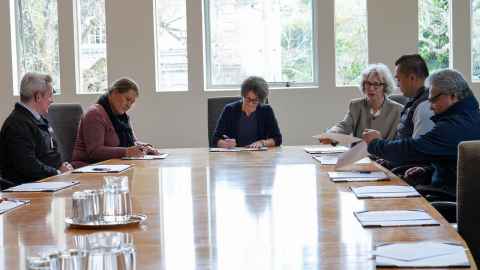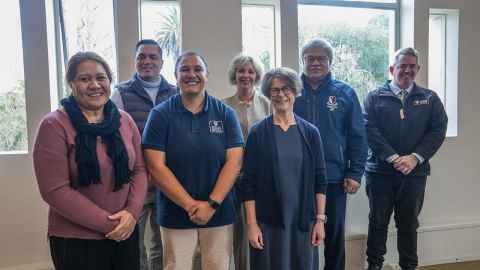Partnership to boost success gains momentum across high schools
27 June 2025
University has its ‘First XV’ with three more schools partnering to boost UE success for Māori and Pacific.

Waipapa Taumata Rau, University of Auckland has its ‘First XV’ with three new secondary schools signing on to an initiative boosting students' academic success.
The partnership between the University and twelve secondary schools launched last year in April, with the goal of achieving University Entrance (UE) parity for Māori and Pacific learners by 2030.
Katalina Ma, Pathways Programme Manager, who manages the project, says ensuring Māori and Pacific secondary students arrive with a ‘fit for purpose’ UE qualification has been the driving force to devise the new initiative and build the partnership.
“The best thing is these three new high schools came to us, so now we have our First XV!
“They reached out to the University; they wanted this for tauira Māori and Pacific learners... We acknowledge you for wanting this, as well as for their whānau,” says Katalina.
The first partnership of its kind nationally, the initiative looks to improve success rates as well explore learnings about school leavers entering the university environment. The initiative was in response to declining rates in UE as well as seeing a declining trend for retention of first year undergraduate students.
On 25 June a special ceremony was held at the University with the addition of three high schools – Kelston Girls’ College, Baradene College of the Sacred Heart and James Cook High School signing a formal agreement to help bring Māori and Pacific on par with non-Māori and non-Pacific students.
They join Alfriston College, Aorere College, Avondale College, De la Salle College, Epsom Girls Grammar School, Manurewa High School, Massey High School, McAuley High School, Mount Albert Grammar School, Mount Roskill Grammar School, St Peter's College and Tangaroa College.
They reached out to the University; they wanted this for tauira Māori and Pacific learners... We acknowledge you for wanting this, as well as for their whānau.

“There is a change in what we are seeing in data, in what we are doing as a partnership,” she told those gathered referring to the number of applications, places offered and acceptances from Māori and Pacific first-year students.
“We are closing the gaps between the number applying and places offered.”
Pro Vice-Chancellor Pacific Professor Jemaima Tiatia-Siau congratulated Katalina and the schools present for taking action.
“This is what we’re about, engaging with our communities, trying to seal what is important. Congratulations for your mammoth work, thank you for coming to the table and demonstrating what is important for our Māori and Pacific students.”
Baradene College of the Sacred Heart principal Alexandra Russell says word of Katalina Ma’s excellent work had reached her school community and they were eager to be involved.
“It was a parent that reached out about what an amazing job Kat is doing, and could our girls be part of this programme?”
Co-associate principal of James Cook High School André Whaanga says they were very excited to be signing up to the initiative.
Katalina says the initiative was also an opportunity for schools and their communities to learn from one another, given NCEA was implemented 23 years ago. She says many families still don’t fully understand the system, with many parents having come through the older system of school certificate, sixth form certificate and bursary.
“This is an opportunity of seeing how UE works, so that students are teaching our families and lifting awareness.”
She says getting all parties on the same page included sharing data with schools that showed attaining NCEA external credits (credits gained by sitting an exam) gave students an advantage, given exams are an assessment type still featured in many stage one papers.
“For the general population, if you come in with more than 20 external credits, then there’s a 92 percent chance of success in your first year of university across any programme.
"Worryingly for our Pacific community, if your young person comes in having no external credits, there’s a 55 percent chance they’ll experience success in their first year. Our partnership with schools is about ensuring our learners, their families, and teachers are well informed and all on the same page.
“When they do experience success, you see them when they cross the stage, when their surname is called out – it’s not just them, you hear the village where they’re from,” Katalina says.
The initiative now in its second year (and set to continue for the next five years) shows great potential for current and future generations of learners, the addition of new schools signing up is a positive sign of progress slowly being made.